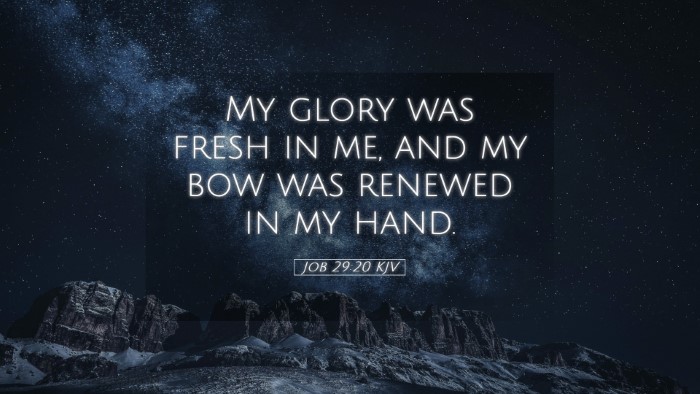Old Testament
Genesis Exodus Leviticus Numbers Deuteronomy Joshua Judges Ruth 1 Samuel 2 Samuel 1 Kings 2 Kings 1 Chronicles 2 Chronicles Ezra Nehemiah Esther Job Psalms Proverbs Ecclesiastes Song of Solomon Isaiah Jeremiah Lamentations Ezekiel Daniel Hosea Joel Amos Obadiah Jonah Micah Nahum Habakkuk Zephaniah Haggai Zechariah MalachiJob 29:20
Job 29:20 KJV
My glory was fresh in me, and my bow was renewed in my hand.
Job 29:20 Bible Commentary
Commentary on Job 29:20
Verse: Job 29:20 - "My glory was fresh in me, and my bow was renewed in my hand."
Introduction
Job 29:20 is situated in a profound moment of reflection for Job, where he reminisces about his past glory and the vigor that once characterized his life. This verse encapsulates Job’s lament and his yearning for a return to the former days of prosperity and divine favor. The insights from various public domain commentaries highlight the rich theological and literary dimensions of this text.
Job's Reflection on His Past Glory
In this verse, Job contrasts his former state of honor and influence with his present suffering. The imagery used by Job provides deep insights into his character and circumstances.
Matthew Henry's Commentary
Henry notes that Job’s reflection highlights how circumstances can drastically change. He states that "glory" signifies not merely reputation but the inner vitality that comes from a life lived in obedience and divine favor. Henry emphasizes that Job's "bow" symbolizes strength and readiness in spiritual endeavors. When Job mentions that his "bow was renewed," it denotes a restoration of spiritual vigor, mirroring the renewal that believers experience when they turn back to God in times of trouble.
Albert Barnes' Notes on the Bible
Barnes expounds that the "glory" of Job was once characterized by the esteem of others, demonstrating his status as a righteous man in society. He suggests that this verse reflects Job's nostalgia for the time when he was seen as a mediator of justice and a benefactor to the needy. Job's statement also indicates a tension between his past and present, serving as a poignant reminder of the fleeting nature of human honor and success.
Adam Clarke's Commentary
Clarke provides a theological analysis of the term "glory," indicating that it refers to Job's internal state and external recognition. He interprets the "renewal of the bow" as indicative of Job's readiness to reclaim his place as a leader and advocate for righteousness. Clarke also posits that this verse serves to reflect the spiritual conflict faced by Job—introspection leads him to long for the days of past vitality, which were marked by God's favor and a life of purpose.
Theological Implications
This verse provides multiple layers of theological implications, pertinent to understanding human suffering, divine justice, and the nature of glory in relation to one's standing before God.
Suffering and Divine Justice
Commentators agree that Job’s lamentation echoes a universal truth about human life—suffering can often overshadow previous states of joy and success. Job’s articulate remembrance of his glory serves as a lens for viewing the paradox of theodicy—where righteous suffering raises profound questions about God’s justice. As Henry aptly remarks, such reflections can lead to a deeper understanding of God’s ways, albeit through the lens of distress.
Renewal in Suffering
Job's assertion that his "bow was renewed in my hand" suggests a profound truth about resilience. Suffering does not only strip a person of their previous glory; it also presents an opportunity for spiritual renewal. Barnes underlines how moments of great distress can lead believers to discover new depths of strength and reliance upon God. This concept positions suffering not simply as devastation but as a stage for growth and renewal in faith.
Practical Applications
For ministers, students, and scholars, this verse can serve as rich soil for practical application in ministry and personal faith journeys.
- Encouragement in Suffering: Just as Job recalls his former glory, so too can believers reflect on their times of faithfulness and strength, encouraging themselves and others to trust in God's renewal.
- The Importance of Reflection: Pastors can encourage congregants to engage in reflective practices to recognize the ways God has been present in their lives, fostering gratitude amidst trials.
- Emphasizing Renewal: The imagery of renewal serves as an invitation to pray for and actively seek rejuvenation of strength and purpose in both individuals and churches.
- Addressing Theodicy: This verse opens conversations about the nature of suffering, allowing for dialogue on difficult theological themes in an accessible manner.
Conclusion
Job 29:20 is a poignant reminder of the dual nature of life, encapsulating pain and remembrance of past glory in a single verse. As we reflect on Job's words, we are challenged to embrace our stories—past and present—and to seek God's renewing grace in times of trial. The combined insights from Matthew Henry, Albert Barnes, and Adam Clarke enrich our understanding of this scripture, making it a valuable contemplation for scholars, pastors, and devoted students of the Word.


